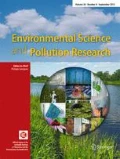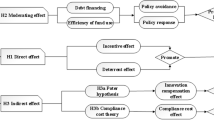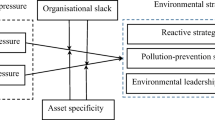Abstract
This study provides a comprehensive assessment of firms’ operation and environmental protection polices in Nigeria and Ghana, where there has been a rising industrial growth amidst low regulatory and institutional frameworks. We analyze the extents to which firms’ adoption of environmental protection policies affect their performances. We use firm-level data of 842 firms (447 for Nigeria and 395 for Ghana) distributed across different regions of both countries for our descriptive and econometric estimations. We find, among other things, that firms’ adoption of internal policies on environmental protection is dismally low in both Nigeria (32%) and Ghana (17%), with policies focused on reducing solid (38%, Nigeria; and 35%, Ghana), gaseous (22%, Nigeria; and 44%, Ghana), and liquid (24%, Nigeria; and 14%, Ghana) pollution. Training appears to be an important intervention that can help improve firms’ adoption of such policies. We also found that firms’ adoption and implementation of environmental protection policies significantly improve their performance.








Similar content being viewed by others
Notes
A generic term used specifically in this paper to connote those enterprises that are not large.
There are many factors that can be considered for such participation to be effective; however, this is not the focus of this study.
The survey instrument was developed through a modification of the World Bank Enterprise Survey instrument.
The effective exchange rates (1 USD to local currency unit) as at the period of the survey are 360 (for Nigeria) and 4.59 (for Ghana).
We check the correlation of the instruments with the likely endogenous variable to understand whether the association is strong, then we perform the over-identification tests to check the validity of the instruments. These statistics are presented immediately after the econometric results on instrumental variable in the “Discussion” section.
This was underreported in the survey, as respondents were unwilling to disclose this value.
References
Akpan GE, Akpan UF (2012) Electricity consumption, carbon emissions and economic growth in Nigeria. Int J Energy Econ Policy 2(4):292–306
Aliyu BU, Noor ABA (2015) Corporate social responsibility practice and corporate financial performance: evidence from Nigeria companies. Social Responsibility Journal 11(4):749–763
Arnold JM, Mattoo A, Narciso G (2008) Services inputs and firm productivity in sub-Saharan Africa: evidence from firm-level data. J Afr Econ 17(4):578–599
Asongu SA (2018a) CO2 emission thresholds for inclusive human development in sub-Saharan Africa. Environ Sci Pollut Res 25:26005–26019. https://doi.org/10.1007/s11356-018-2626-6
Asongu SA (2018b) ICT, openness and CO2 emissions in Africa. Environ Sci Pollut Res 25(10):9351–9359
Asongu SA (2018c) Comparative sustainable development in sub-Saharan Africa, Sustainable Development, 1-14, https://doi.org/10.1002/sd.1733
Asongu SA, El Montasser G, Toumi H (2016) Testing the relationships between energy consumption, CO2 emissions and economic growth in 24 African Countries: a panel ARDL approach. Environ Sci Pollut. Res 23(7):6563–6573
Ayuso S, Navarrete-Báez FE (2017) How does entrepreneurial and international orientation influence SMEs’ commitment to sustainable development? Empirical Evidence from Spain and Mexico. Corp Soc Responsib Environ Manag 25(1):80–94
Bai J, Jayachandran S, Malesky EJ, Olken BA (2017) Firm growth and corruption: empirical evidence from Vietnam. Econ J. https://doi.org/10.1111/ecoj.12560
Becker SO, Ichino A (2002) Estimation of average treatment effects based on propensity scores. Stata J 2(4):358–377
Bridge S, O’Neill K, Cromie S (2003) Understanding enterprise, entrepreneurship and small business. 2nd edition. New York. Palgrave Macmillan. ISBN 0-333- 98,465-X.
Caliendo M, Kopeinig S (2008) Some practical guidance for the implementation of propensity score matching. J Econ Surv 22(1):31–72
Chang L, Li W, Lu X (2015) Government engagement, environmental policy, and environmental performance: evidence from the most polluting Chinese listed firms. Bus Strateg Environ 24(1):1–19
Chell E (1985) The entrepreneurial personality: a few ghosts laid to rest? Int Small Bus J 3(3):43–54
Connor SE, Thomas I (2003) Sediments as archives of industrialisation: evidence of atmospheric pollution in Coastal Wetlands of Southern Sydney, Australia. Water Air Soil Pollut 149(1-4):189–210
Currin E (2012) Businesses going green: an analysis of the factors that motivate firms to adopt environmentally friendly practices. 6: 35-50.
De Rosa D, Gooroochurn N, Gorg H (2015) Corruption and productivity: firm-level evidence. Jahrbücher für Nationalökonomie und Statistik 235(2):115–138
Earnhart D (2004) The effects of community characteristics on polluter compliance levels. Land Econ 80(3):408–432
Earnhart D, Lizal L (2007) Effect of pollution control on corporate financial performance in a transition economy. Environmental Policy and Governance 17(4):247–266
Earnhart D, Lizal L (2010) The effect of corporate environmental performance on financial outcomes - profits, revenues, and costs: evidence from the Czech Transition Economy, University of Kansas and William Davidson Institute. Retrieved from http://citeseerx.ist.psu.edu/viewdoc/download?doi=10.1.1.193.7948&rep=rep1&type=pdf. Accessed 15 Oct 2018
Earnhart D, Lizal L (2011) The effect of corporate environmental performance on financial outcomes – profits, revenues, and costs: evidence from the Czech Transition Economy, DIME Final Conference, 6-8 April 2011. Retrieved from http://www.vcharite.univ-mrs.fr/ocs/index.php/LAGV/LAGV10/paper/viewFile/466/192. Accessed 15 Oct 2018
Efobi UR, Orkoh E (2018) Analysis of the impacts of entrepreneurship training on growth performance of firms: quasi-experimental evidence from Nigeria. Journal of Entrepreneurship in Emerging Economies 10(3):524–542
Efobi UR, Tanankem B, Beecroft I (2017) Incentives and firm productivity: exploring multidimensional fiscal incentives in a developing country. World Development Perspectives 5:56–59
Efobi UR, Beecroft I, Belmondo T (2018) Small businesses and the adoption of the Integrated Tax Administration System in Nigeria, International Centre for Tax and Development Working Paper Series, UK, Forthcoming.
Evan M (2015) We can’t ignore the air pollution crisis in Africa’s fast-growing megacities. The Conversation, http://theconversation.com.
Famiyeh S (2017) Corporate social responsibility and firm’s performance: empirical evidence. Social Responsibility Journal 13(2):390–406. https://doi.org/10.1108/SRJ-04-2016-0049
Hallegatte S, Fay M, Vogt-Schilb A (2013) Green industrial policies: when and how. World Bank Policy Research Working Paper WPS6677. World Bank, Washington
Heckman J, Hidehiko, Todd (1997) Matching as an econometric evaluation estimator: evidence from evaluating a job training program. Rev Econ Stud 64(4):605–654
Karagulian F, Belis CA, Dora CFC, Prüss-Ustün AM, Bonjour S, Adair-Rohani H, Amann M (2015) Contributions to cities' ambient particulate matter (PM): a systematic review of local source contributions at global level. Atmos Environ 120:475–483
Klassen R, McLaughlin C (1996) The impact of environmental management on firm performance. Manag Sci 42(8):1199–1214
Konar S, Cohen M (2001) Does the market value environmental performance? Rev Econ Stat 83(2):281–289
Lalinsky T (2013) Firm competitiveness determinants: results of a panel data analysis, National Bank of Slovenia Working Paper, Nos. 4/2013, Available at http://www.nbs.sk/_img/Documents/PUBLIK/WP_4_2013_Lalinsky_Firm_competitiveness_determinants_panel.pdf. Accessed 15 Oct 2018
Lang A, Murphy-Gregory H (2014) Business and sustainability: between government pressure and self-regulation, Springer, https://doi.org/10.1007/978-3-319-07239-5
Lopez-Gamero M, Molina-Azorín JF (2016) Environmental management and firm competitiveness: the joint analysis of external and internal elements, long range planning, 49(6): 746-763.
Manrique S, Marti-Ballester C (2017) Analyzing the effect of corporate environmental performance on corporate financial performance in developed and developing countries. Sustainability 9:1–30. https://doi.org/10.3390/su9111957
Mbah PO, Nzeadibe TC (2016) Inclusive municipal solid waste management policy in Nigeria: engaging the informal economy in post-2015 development agenda, Local Environment. The International Journal of Justice and Sustainability 22(2):203–224
McArthur J, Teal F (2004) Corruption and firm performance in Africa, Development and Comp Systems 0409015, EconWPA.
McMahon RGP (2001) Growth and performance of manufacturing SMEs: the influence of financial management characteristics. Int Small Bus J 19(3):10–28
Mesquita LF, Lazzarini SG, Cronin P (2007) Determinants of firm competitiveness in Latin American emerging economies: evidence from Brazil’s auto-parts industry. Int J Oper Prod Manag 27(5):501–523. https://doi.org/10.1108/01443570710742384
Newman C, Page J, Rand J, Shimeles A, Söderbom M, Tarp F (2016) Made in Africa: learning to compete in industry. Brookings Institution Press.
OECD (2001) Encouraging Environmental Management in Industry. OECD Publications, Paris
Osabuohien ES, Efobi U, Gitau C (2014) Beyond the Environmental Kuznets Curve in Africa: evidence from panel cointegration. J Environ Policy Plan 16(4):517–538
Oyelaran-Oyeyinka B (2007) SME: issues, challenges and prospects. A presentation at the International Conference on Financial System Strategy (FSS) 2020. Organized by the Central Bank of Nigeria in Abuja from 18th to 20th June.
Page J (2016) Commodities, industry, and the African Growth Miracle. Africa in Focus. Available at https://www.brookings.edu/blog/africa-in-focus/2016/04/05/commodities-industry-and-the african-growth-miracle/. Accessed 22 Sept 2018
Partnership for Action on Green Economy - PAGE (2015) Ghana: green industry and trade assessment, UNIDO, Retrieved from https://www.unido.org/sites/default/files/2016-02/GITA_Ghana_0.pdf. Accessed 22 Sept 2018
Qi GY, Zeng SX, Shi JJ, Meng XH, Lin H, Yang QX (2014) Revisiting the relationship between environmental and financial performance in Chinese industry. J Environ Manag 145:349–356
Roe MJ (2013) Political determinants of corporate governance: political context, corporate governance: political context, corporate impact. Oxford University Press, Oxford
Rosenbaum PR (2002) Covariance adjustment in randomized experiments and observational studies. Stat Sci 17(3):286–327
Roy R (2016) The cost of air pollution in Africa. OECD Development Centre Working Paper No. 333, OECD Publishing, Paris, https://doi.org/10.1787/5jlqzq77x6f8-en.
Sharma S (2000) Managerial interpretations and organizational context as predictors of corporate choice of environmental strategy. Acad Manag J 43(4):681–697
Shi H, Zhang L (2006) China’s environmental governance of rapid industrialization. Environmental Politics 15(2):271–292
Stewart WH Jr, Watson WE, Carland JC, Carland JW (1998) A proclivity for entrepreneurship: a comparison of entrepreneurs, small business owners, and corporate managers. J Bus Ventur 14(2):189–214
United Nations Environment Programme (2017) Towards a pollution-free planet background report. United Nations Environment Programme, Nairobi.
United Nations Industrial Development Organization – UNIDO (2011) UNIDO Green industry: policies for supporting green industry. UNIDO, Vienna
Wang X, Wang S (2013) Chairman’s government background, excess employment and government subsidies: evidence from Chinese local state-owned enterprises. China Journal of Accounting Research 6(1):51–74
Wichmann J (2016) Africa has an air pollution problem but lacks the data to tackle it https://theconversation.com/africa-has-an-air-pollution-problem-but-lacks-the-data-to-tackle-it-69057. Accessed 22 Sept 2018
World Bank (2014) Building competitive green industries: the climate and clean technology opportunity for developing countries. Available at www.infodev.org. Accessed 15 Oct 2018
World Bank (2016) Doing business 2016: measuring regulatory quality and efficiency. World Bank, Washington
World Bank (2018) World development indicators. World Bank, Washington
Yakubu OH (2018) Particle (Soot) Pollution in Port Harcourt Rivers State, Nigeria-double air pollution burden? Understanding and Tackling Potential Environmental Public Health Impacts. Environments 5(1):1–22
Acknowledgement
This paper is drawn from the comprehensive report on green industrialization in Nigeria and Ghana, which is a funded project by the Institute of African Leadership for Sustainable Development (UONGOZI Institute), Tanzania. We are grateful to the UONGOZI institute for the grant to undertake this project, and for the UONGOZI institute’s scientific committee for their comments on the first draft. Comments from participant at the DIE conference on green transformation and competitive advantage are also acknowledged. Finally, the constructive comments from the two anonymous reviewers are also well appreciated.
Author information
Authors and Affiliations
Corresponding author
Additional information
Responsible editor: Nicholas Apergis
Appendix
Appendix
Rights and permissions
About this article
Cite this article
Efobi, U., Belmondo, T., Orkoh, E. et al. Environmental pollution policy of small businesses in Nigeria and Ghana: extent and impact. Environ Sci Pollut Res 26, 2882–2897 (2019). https://doi.org/10.1007/s11356-018-3817-x
Received:
Accepted:
Published:
Issue Date:
DOI: https://doi.org/10.1007/s11356-018-3817-x




